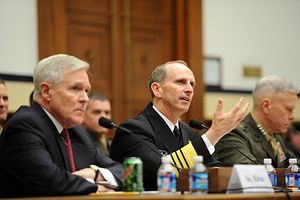So the Naval Diplomat evidently touched a nerve within the naval community with Sunday’s column musing about whether America suffers from a maritime-strategists gap. Oh, well. He Was Uncontroversial isn’t an inscription I would want etched on my gravestone. For instance, an old friend who wears the naval-aviation community’s Wings of Gold sends the following cri de coeur:
“As an aviator, I must disagree with one statement: that the ‘sea services have been enjoying a prolonged strategic holiday since the Soviet Navy evanesced two decades ago.’
“When I was getting shot at over Iraq in the late 1990s and 2000s and was pickling bombs in return, I didn’t feel like I was on a holiday!?!”
He, she, or it refers, of course, to allied air forces’ enforcement of the no-fly zones over Iraq. Iraqi air-defense rocketeers made a habit of illuminating allied warplanes with fire-control radar, whereupon allied pilots thoughtfully replied with ordnance. Peril was a daily companion. Some holiday!
Holiday is the objectionable word in this exchange of friendly fire. My hero Mark Twain joked that the difference between the right word and the almost-right word is the difference between lightning and a lightning-bug. But strategic holiday is the right term for this interlude. It accurately captures the U.S. Navy’s respite from any navy’s chief function, namely preparing to wrest command of the sea from rival fleets. My reply, edited for clarity and to remove the vulgarities to which we sailors are lamentably prone:
“Sheesh … touchy, touchy. The point is that you guys didn’t have to fight for maritime command before patrolling over Iraq. You were exploiting command of the sea that was unchallenged by any serious opponent.
“If you doubt what I say here, have a look at the preamble to … From the Sea, which explicitly says we no longer have a peer opponent and can focus exclusively on projecting power ashore …You guys were operating from bases at sea and the U.S. Air Force [was] operating from bases on shore.
“For what it’s worth, I’d lump my own wartime experience (Desert Shield/Storm) into the same category. When you don’t have to win command before exercising it, by definition that’s a holiday from history. I guess the past 22-odd years have been our equivalent to the Royal Navy’s mid-19th century – imperial police operations, but no contest from a rival navy.”
Think about it. How much strategic thinking do you do on a holiday, once released from the everyday cares of your profession? Not much, one suspects. It’s only natural, then, for a strategic holiday to dull your professional edge. And it’s commonplace to come back from a holiday with a hangover. Or so I’ve heard. The same goes for institutions.
To shift metaphors, furthermore, it’s natural for a rising contender to think intensively about how to unseat the reigning champ. Muhammad Ali had his rope-a-dope strategy against a stronger George Foreman in the Rumble in the Jungle. The U.S. Navy, the Foreman of today’s maritime world, needs to regain its intellectual edge to retain the title – or, better yet, to discourage any would-be challenger from seeking a bout.
That is all.

































